Advertisements
Advertisements
प्रश्न
Why did the crocodile’s wife want to eat the monkey’s heart?
उत्तर
The crocodile’s wife was annoyed with him for spending a lot of time with the monkey. She was fed up with managing the young ones alone. So she planned to get rid of the monkey once for all.
APPEARS IN
संबंधित प्रश्न
Tick the right answer.
When you appreciate something, you (find it good and useful/find it of no use).
On the basis of your understanding of the poem, answer the following question
by ticking the correct option.
The tone and mood of the rain in the poem reflects its_________.
Read the following extracts from the story, and try to puzzle out the meanings of the encircled words from other words and phrases in the extract. Write the clues in the empty boxes. Then give your own explanation of the encircled word.
When the liner had finally vanished over the horizon, I was absolutely alone in the stormy night sea. First I thought I had to swim one way, then another. It was not even midnight yet, and I had no hope at all of finding my way in this terrible night time ocean. I began to feel afraid. Waves of fear rolled through me, starting from my hands and feet, attacking my heart and then reaching through my neck to my head. Waves broke over me and water went into my snorkel. I realised I would not be able to last even half an hour in such a condition.
I saw individual stars, but I could not distinguish the constellations they belonged to. Then dawn came and put out all my stars and I felt my solitude more keenly. The sky was grey at first, then blue-violet shades appeared. In a few minutes, the colours became brighter, with dark red strips cutting across the sky!
The rising sun came up over the ocean. I was surrounded by large waves. The clouds turned pink and swept across the sky in all directions. It was a windy day.
There was no land visible. I grew alarmed. Had I made a mistake in my calculations? Perhaps the current had carried me a long a way off the course during the night?
An hour passed, perhaps two. "Landlll" I could not deny myself the pleasure of shouting the magic word aloud and of hearing my own voice. Perhaps it was my ghostly island of Siargao? I almost felt I had succeeded - now at least I had hope.
The sun looked out for the last time, as if it was saying goodbye to me, and hid itself away again. In a few minutes the sky was filled with all the colours of a rainbow, the bright shades changing and merging as I watched. At first the clouds became deep red and then their edges turned bright orange. A little while afterwards, the clouds turned lilac and dark violet. Darkness fell swiftly. My second lonely night in the ocean began. The stars came out unnoticed. I changed course and headed for the south west. As it turned out, this was an unforgivable mistake.
Evening was approaching. The ocean around me was full of life; large fish often leapt out of the water and big birds flew right above my head. I could see the island distinctly now. A line of dancing palms stretched the length of its shore. The sides of the mountain were covered in many different shades of green.
An hour passed, perhaps more. It was extraordinarily quiet. Then suddenly to my horror, I discovered my island had noticeably begun to move north and was drifting further and further in that direction right before my eyes. Before I had worked out what was happening and could sharply change my course towards the north, the southern tip of the island had appeared in front of me and, beyond that, open ocean stretched to the very horizon. I was totally at the mercy of the current and realised to my alarm that it was slowly carrying me past the land.
My third night in the ocean crept up unnoticed. This third night in the ocean was very dark, much darker than the two previous ones. I almost decided to die as I had no hope of seeing another dawn. I was suddenly aware of a quiet voice: "Swim to the sound of the breakers."
Indeed, there had been a distant rumbling for some time, although I had paid no attention to it. Now, I started listening and I thought it sounded like the characteristic noise of jet aeroplanes constantly landing and taking off. The voice inside kept insisting that I should swim towards this thunder of waves.
At last I obeyed. Again I heard an approaching rumble. What I suddenly saw at a distance of about 30 or 40 metres has imprinted itself on my memory forever. It was a gigantic wave with steep, very slowly falling crests. Never in my life had I seen such an enormous wave - it even seemed to be touching the sky. It moved very slowly and was fantastically beautiful.
The wave did not break over me as I assumed it would. An irresistible force dragged me up its steep slope right to the very foot of the falling crest. Instinctively I clutched my mask snorkel and managed to take a deep breath. The crest started to break over me and pulled me under it. For a moment, I found myself in the air
under the crest as ifin a cave. Then my body was in a swirling current of water; the inner power of the wave made me recover several times, twisting me in all directions before it subsided.
I realised that I had to try to keep my body on the crest and I quickly took up a horizontal position. This time the wave quickly grabbed me and carried me at great speed for quite a long distance on its crest.
I got up to the surface easily and swam in the direction the waves were heading. "Somewhere there, beyond the reef, there should be a lagoon," I hoped.
Suddenly, I felt something hard under my feet. I could stand up to my chest in water! Around me I could see random currents of water, splashes of foam and phosphorescent spray, all swirling about. Before I fully came to my senses, another large wave approached and carried me some distance further. I was up to my waist in water when a new wave picked me up, taldng me several metres forward. Now the depth of the water was only up to my knees. I had enough time to take a few tentative steps, to catch my breath and look around.
I surfaced at the foot of very tall palm trees. I left a trail of luminous water and my body glittered like some princess's ball-gown. Only now did I feel completely safe. The ocean was behind me ....
(a) I saw individual stars, but I could not distinguish the constellation they belonged to. Then dawn came and put out all my stars.
Therefore, constellation means ................... 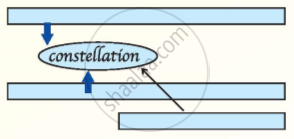
(b) Indeed there had been a distant rumbling for some time, although I had paid no attention to it. Now that I started listening to it I thought it sounded like the characteristic noise of jet airplanes constantly landing and taking off.
Therefore, rumbling means ............
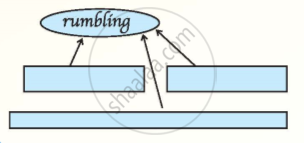
(c) It was a gigantic wave with steep, very slowly falling crests. Never in my life had I seen such an enormous wave. It seemed to be touching the sky.
Therefore, gigantic means ............
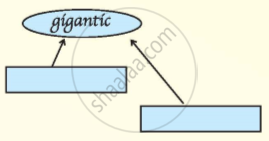
(d) The wave did not break over me as I assumed it would. An irrsistible force dragged me up its steep slope, right to the very foot of the falling crest.
Therefore , irrisistible means.....................

(e) For a moment, I found myself caught in the air under the crest, as if in a cave . Then , my body was in the swirling current of water ; the inner power of the wave made me recover several times , twisting me in all directions before it subsided .
Therefore , swirling means..........
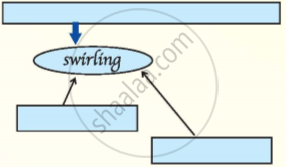
(f) All around me I could see random currents of water splashes of foam and phosphorescent spray of luminous water and my body glittered like some princess's ball gown.
Therefore, phosphorescent means .................
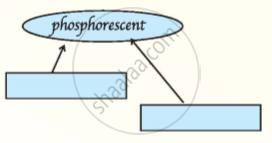
Present Perfect Continuous
Read the following sentences with the present perfect continuous tense
form
1. Mr and Mrs Singh have been living in the same house in the same town
for the last five years.
2. "Have you beenkeepingyourpocketmoneysafely, Rani?"
These sentences illustrate the main use of the Present Perfect Continuous
tense to show that the action started in the past and is still in progress in
the present.
The next man looking 'cross the way
Saw one not of his church
And Couldn't bring himself to give
The fire his stick of birch.
The third one sat in tattered clothes.
He gave his coat a hitch.
Why should his log be put to use
To warm the idle rich?
The rich man just sat back and thought
of the wealth he had in store
And how to keep what he had earned
From the lazy shiftless poor.
Read the lines given above and answer the question that follow.
Which is the symbol word used in these lines?
It matters little where we pass the remnant of our days. They will not be many. The Indian’s night promises to be dark. Not a single star of hope hovers above his horizon. Sad-voiced winds moan in the distance. Grim fate seems to be on the Red Man’s trail, and wherever he will hear the approaching footsteps of his fell destroyer and prepare stolidly to meet his doom, as does the wounded doe that hears the approaching footsteps of the hunter.
A few more moons, a few more winters, and not one of the descendants of the mighty hosts that once moved over this broad land or lived in happy homes, protected by the Great Spirit, will remain to mourn over the graves of a people once more powerful and hopeful than yours. But why should I mourn at the untimely fate of my people? Tribe follows tribe, and nation follows nation, like the waves of the sea. It is the order of nature, and regret is useless. Your time of decay may be distant, but it will surely come, for even the White Man whose God walked and talked with him as friend to friend, cannot be exempt from the common destiny. We may be brothers after all. We will see.
Read the extract given below and answer the question that follow.
How does the speaker realize that he should not mourn the untimely fate of his people?
We will ponder your proposition and when we decide we will let you know. But should we accept it, I here and now make this condition that we will not be denied the privilege without molestation of visiting at any time the tombs of our ancestors, friends, and children. Every part of this soil is sacred in the estimation of my people. Every hillside, every valley, every plain and grove, has been hallowed by some sad or happy event in days long vanished. Even the rocks, which seem to be dumb and dead as the swelter in the sun along the silent shore, thrill with memories of stirring events connected with the lives of my people, and the very dust upon which you now stand responds more lovingly to their footsteps than yours, because it is rich with the blood of our ancestors, and our bare feet are conscious of the sympathetic touch. Our departed braves, fond mothers, glad, happy hearted maidens, and even the little children who lived here and rejoiced here for a brief season, will love these somber solitudes and at eventide they greet shadowy returning spirits. And when the last Red Man shall have perished, and the memory of my tribe shall have become a myth among the White Men, these shores will swarm with the invisible dead of my tribe^ and when your children’s children think themselves alone in the field, the store, the shop, upon the highway, or in the silence of the pathless woods, they will not be alone. In all the earth there is no place dedicated to solitude. At night when the streets of your cities and villages are silent and you think them deserted, they will throng with the returning hosts’that once filled them and still lover this beautiful land. The White Man will never be alone.
Let him be just and deal kindly with my people, for the dead are not powerless. Dead, did I say? There is no death, only a change of worlds.
Read the extract given below and answer the question that follow.
When will the shores swarm with the invisible dead of the speaker’s tribe? Why?
“There were three animals altogether,” he explained. “There were two goats and a cat and then there were four pairs of pigeons.”
“And you had to leave them?” I asked.
“Yes. Because of the artillery. The captain told me to go because of the artillery.” “And you have no family?” I asked, watching the far end of the bridge where a few last carts were hurrying down the slope of the bank.
“No,” he said, “only the animals I stated. The cat, of course, will be all right. A cat can look out for itself, but I cannot think what will become of the others.”
“What politics have you?” I asked.
“I am without politics,” he said. “I am seventy-six years old. I have come twelve kilometers now and I think now I can go no further.”
“This is not a good place to stop,” I said. “If you can make it, there are trucks up the road where it forks for Tortosa.”
“I will wait a while,” he said, “ and then I will go. Where do the trucks go?” “Towards Barcelona,” I told him.
“I know no one in that direction,” he said, “but thank you very much.
Read the extract given below and answer the question that follow.
Where did the narrator want the old man to go?
After considering the matter, and talking it over with his wife, farmer Jones said that he would take John, and do well by him, now that his mother was out of the way; and Mrs. Ellis, who had been looking out for a bound girl, concluded that it would be charitable in her to make choice of Katy, even though she was too young to be of much use for several years.
“I could do much better, I know,” said Mrs. Ellis; “but as no one seems inclined to take her, I must act from a sense of duty expect to have trouble with the child; for she’s an undisciplined thing—used to having her own way.”
But no one said “I’ll take Maggie.” Pitying glances were cast on her wan and wasted form and thoughts were troubled on her account. Mothers brought cast-off garments and, removing her soiled and ragged clothes, dressed her in clean attire. The sad eyes and patient face of the little one touched many hearts, and even knocked at them for entrance. But none opened to take her in. Who wanted a bed-ridden child?
“Take her to the poorhouse,” said a rough man, of whom the question “What’s to be done with Maggie?” was asked. “Nobody’s going to be bothered with her.”
“The poorhouse is a sad place for a sick and helpless child,” answered one.
“For your child or mine,” said the other, lightly speaking; “but for tis brat it will prove a blessed change, she will be kept clean, have healthy food, and be doctored, which is more than can be said of her past condition.”
Read the extract given below and answer the question that follow.
Who came to mourn the dead woman? Why did no one follow the dead cart?
Its a cruel thing to leave her so.”
“Then take her to the poorhouse: she’ll have to go there,” answered the blacksmith’s wife, springing away, and leaving Joe behind.
For a little while the man stood with a puzzled air; then he turned back, and went into the hovel again. Maggie with painful effort, had raised herself to an upright position and was sitting on the bed, straining her eyes upon the door out of which all had just departed, A vague terror had come into her thin white face.
“O, Mr. Thompson!” she cried out, catching her suspended breath, “don’t leave me here all alone!” ,
Though rough in exterior, Joe Thompson, the wheelwright, had a heart, and it was very tender in some places. He liked children, and was pleased to have them come to his shop, where sleds and wagons were made or mended for the village lads without a draft on their hoarded sixpences.
“No, dear,” he answered, in a kind voice, going to the bed, and stooping down over the child, “You she’n’t be left here alone.” Then he wrapped her with the gentleness almost of a woman, in the clean bedclothes which some neighbor had brought; and, lifting her in his strong arms, bore her out into the air and across the field that lay between the hovel and his home.
Read the extract given below and answer the question that follow.
Describe the feelings and plight of Maggie when she was left alone.
How did the king promise to reward the person who would answer his questions correctly?
What items of food did Golu take before leaving his home for the Limpopo river?
How was Mahmoud, the cook, attached to the tiger cub?
Why was Tansen afraid of singing Raga Deepak?
Use the word ‘shade’ in a sentence of your own.
Why did the narrator run away seeing the garden snake?
Multiple Choice Question:
A family is made of the people who ________
With your partner, complete the following sentence in your own word using the ideas in the poem.
Words are the __________________ of thought.
What strategy does Cassius suggest that the conspirators follow?
Complete the following sentence by providing a reason.
In Act V Scene viii of the play Macbeth, Macbeth initially refuses to fight Macduff because ______.
